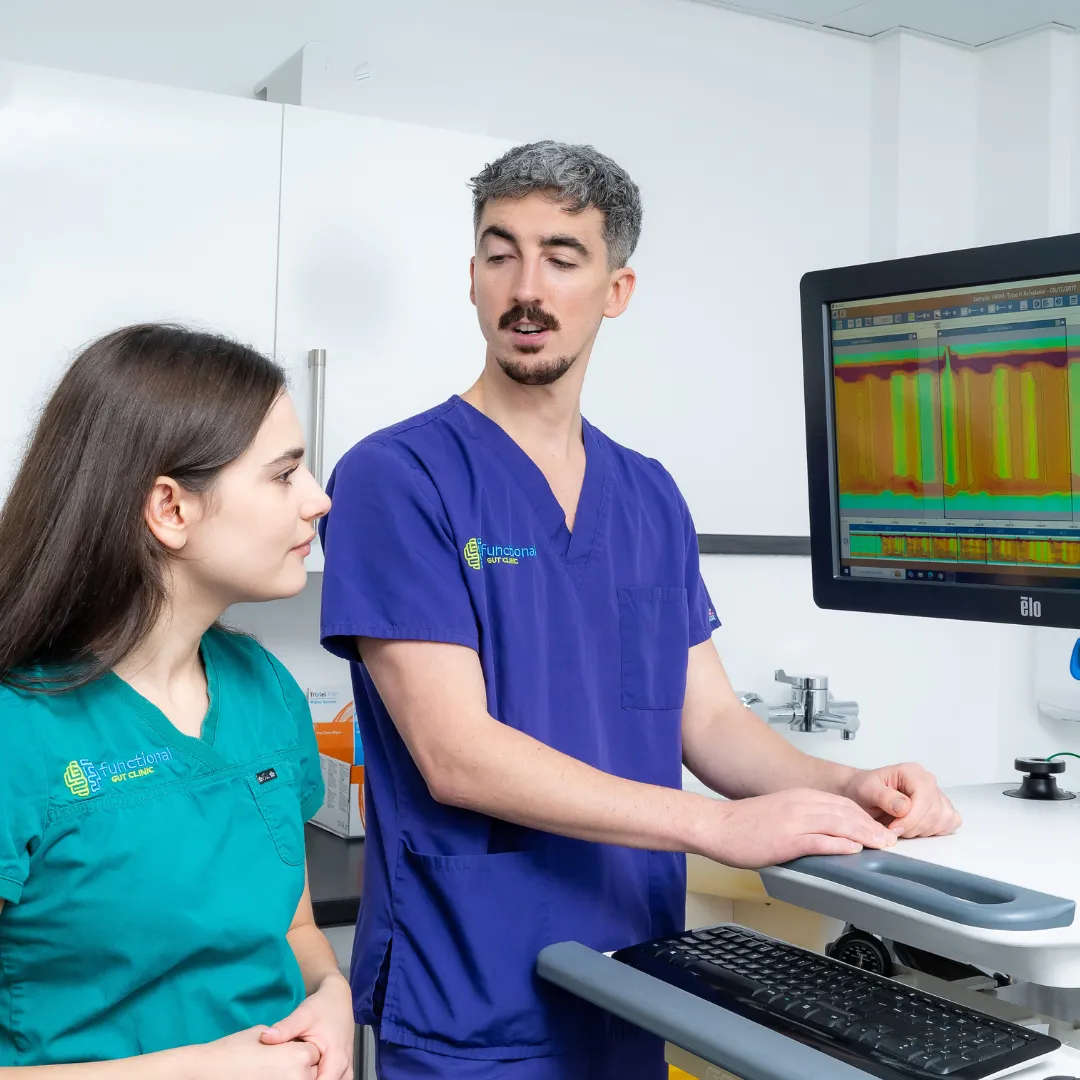Bloating
Struggling with bloating? Here’s what you need to know to find relief.
ALL TEST ARE ACCREDITED & REGULATED BY



What is bloating?
When you’re bloated, your stomach or abdomen can feel full and uncomfortable, or even painful.
This bloating happens when your gastrointestinal tract contains too much gas or air. Bloating can be mild, or more severe, and may present as:
– A visibly distended or swollen abdomen
– Feeling very full and uncomfortable
– Feeling of tightness in the abdomen
– Excess gas – belching and/or flatulence
– Rumbling or gurgling
There are several causes of bloating, so it’s important to diagnose the cause of your bloating and find out why it’s happening to you.

Why does bloating happen?
Prolonged periods of bloating could indicate an underlying health problem, if so you should see your GP.
Possible causes can include:
Irritable bowel syndrome (IBS diagnosis)
Ulcerative colitis, a form of inflammatory bowel disease (IBD), where the inner lining of the large bowel is inflamed and develops ulcers
Crohn’s disease, the other form of IBD, where some parts of your colon are inflamed
Too much bacteria in your small intestine (called small intestinal bacterial overgrowth, or SIBO)
Gastroesophageal reflux disease
Food intolerances, especially lactose or fructose intolerance
Producing too much gas (dysbiosis and fermentation)
Weight gain
Stress or anxiety
Delays in your food and drink moving on from your stomach (called gastroparesis)
Eating too quickly, so that you swallow too much air (called aerophagia)


Diagnosing bloating
Feeling bloated is no fun, but once you know what’s going on you can start to manage your symptoms and the underlying causes.
Testing options:
At the Functional Gut Clinic, we can run the following tests to diagnose the causes of bloating:
Gastric emptying test– which measures how quickly food leaves your stomach
Carbohydrate malabsorption breath test– which finds out if you have certain food intolerances (lactose or fructose)
Small intestinal bacterial overgrowth (SIBO) breath test– which finds out if you have an overgrowth of bacteria in your small intestine (called SIBO)
Oesophageal manometry– which measures the function of your oesophagus (food pipe)
24-hour pH impedance monitoring– which looks at whether you have any reflux
Colonic transit study-a non-invasive test which looks at how long it takes for faeces to pass through your bowl
Learn more about bloating

3 Foods That Could Cause Bloating
3 Foods that cause bloating
Bloating is one of the most common digestive problems people complain about, and the food we are eating is often to blame.
Some food components are digested in the large bowel (right at the end of your gut) by healthy gut bacteria. This process is known as fermentation and naturally produces gas. It is this gas which can leave you feeling bloated and uncomfortable.
In other cases, a malabsorption of certain sugars may be to blame. For example, those with lactose intolerance will find that they are unable to digest lactose, a sugar naturally found in dairy. Not being able to digest lactose would therefore lead to bloating.
Carry on reading as we discuss 3 foods which may be the cause of your bloating.
1. Fruit
Fruits contain a sugar known as fructose.
Some individuals are fructose intolerant, meaning that they are unable to digest this sugar, leading to its fermentation in the large bowel, gas production, and ultimately bloating.
This does not mean that these individuals need to avoid all fruit, as some fruits are easier to digest than others. This is because some fruits, contain similar amounts of both glucose and fructose.
Why is it good that the fruit also contains glucose? Because glucose helps us absorb fructose, preventing digestive problems.
Interestingly, many people without a true ‘intolerance’ to fructose will still suffer with bloating when eating large quantities of fruit. This is because their gut has a maximum amount of fructose it can deal with at any one point. So, avoiding larger portions such as smoothies and fruit bowls may be of benefit.
2. Chewing
Sugar-free chewing gum is another popular ‘food’.
It has benefits in helping with oral hygiene and many people will go through several pieces in a day.
The problem here is that sugar-free chewing gum mostly contains sweeteners which are sugar alcohols. These sweeteners can’t be broken down or absorbed by our bodies, leading to their fermentation, and consequent bloating and even diarrhoea.
Again, there is often a tolerance level with this, so it is worth reducing the amount you use slowly if you are experiencing unpleasant symptoms to see where your tolerance levels lie.
3. Wheat
Wheat contains a fermentable carbohydrate known as a fructan. In some people with IBS, fructans can trigger symptoms of bloating as they get digested by gut bacteria, producing gas.
Think you might be intolerant to lactose or fructose? Find out more about our lactose and fructose intolerance breath tests.
Hear from people we’ve helped, just like you.
"Very professional while welcoming and friendly"
"The manner and demeanour of all staff from reception to people carrying out the test was very professional but welcoming and friendly. Atmosphere is very relaxed and all instructions clear and concise."
London Patient

"Highly recommend this"
"Thanks to Dr Hobson and everyone at the Functional Gut Clinic. The whole team is very kind and generous and they are doing things that are cutting edge and they actually get results."
Manchester Patient

"Highly recommend this"
"After stopping my lansoprazole, every time I had a warm drink, I could feel it burn all the way down to my stomach. Thank you to Sam for making me feel at ease." - Manchester Patient

"My experience could not be better"
"Pleasant and knowledgeable staff that made the experience more enjoyable than it should be!" - London Patient

"Very friendly and knowledgeable"
"An excellent service from beginning to end. I would recommend to anyone who was considering having testing done. Very friendly and knowledgeable!" - Manchester Patient

"Very kind and helpful"
"It was also great to have time to talk to the clinicians – very important when you have problems. Reception staff also very kind and helpful." - Manchester Patient

Are you experiencing any other symptoms
Symptoms are often closely connected. Find out more below.
Reflux

Burning mid-chest, worse when bending or lying down
Constipation

Difficulty going to the toilet, unusual stools, often with stomach ache or intestinal cramps, bloating, nausea or appetite loss
Heartburn

A burning pain in your chest, just behind your breastbone.
The pain is often worse after eating...
Regurgitation

Bringing food or drink back up, difficulty swallowing, feeling that food or drink is stuck in your throat, horrible taste in your mouth
Swallowing Issues

Dysphagia - difficulty swallowing, feeling that food or drink is stuck in your throat, horrible taste in your mouth
Diarrhoea

Loose or explosive stools, can’t get to a toilet in time
Abdominal Pain

Cramps; sharp or dull pain, Bloating, Excessive belching, Nausea or vomiting
Faecal Incontinence

Stools leak unexpectedly, Can’t get to a toilet in time
IBS

Abdominal pain or cramping, bloating, changes in bowel habits and urgency, gas

